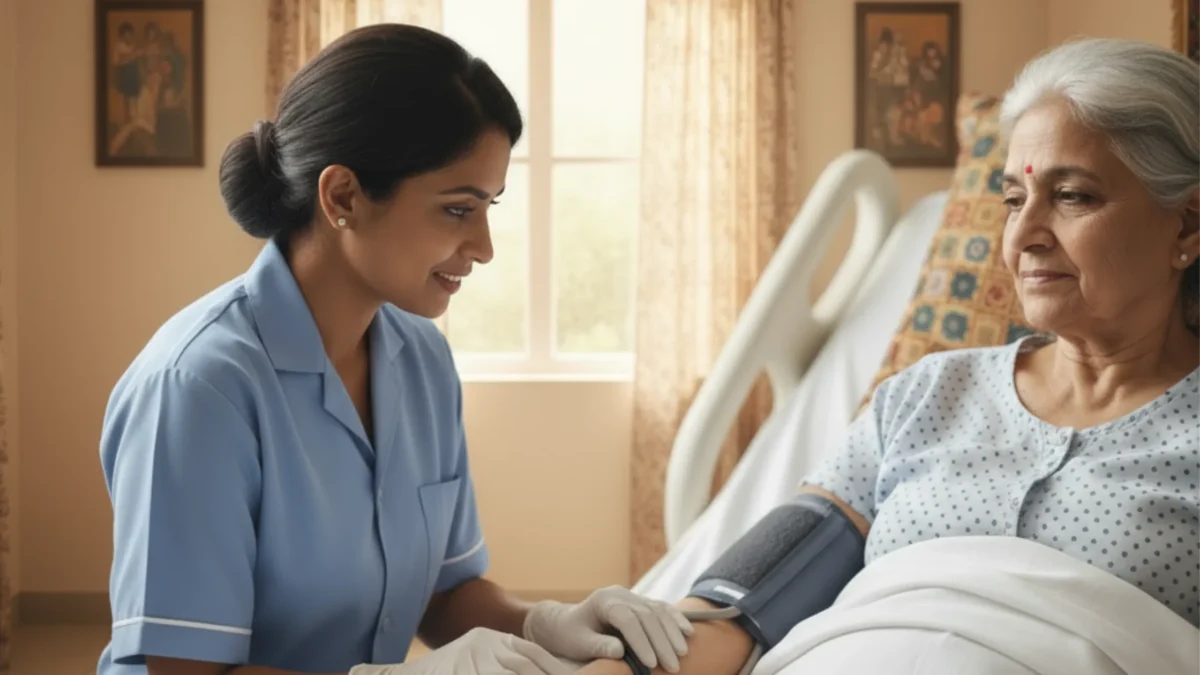Daily Checklist for Bedridden Patient Care: Tools & Techniques That Work

Home Nursing Care vs Hospital Care: What’s Better for Elderly in Udupi & Mangalore?
November 9, 2025
Elderly Home Care in Shivamogga: Common Challenges & How Professional Nursing Helps
November 23, 2025Families managing a bedridden patient — especially after a surgery — often navigate a complex blend of clinical routines, emotional strain, and logistical challenges. The risks escalate without a structured care plan: infections, pressure sores, muscle stiffness, dehydration, and mental distress.
A well-structured daily checklist for bedridden patient care strengthens post-surgery recovery, prevents complications, and enhances patient comfort. This guide outlines routine schedules, essential tools, mobility protocols, safety measures, and professional nursing support available in Mysore, Hassan, and Shivamogga to ensure high-quality home care with clinical precision and reliability.
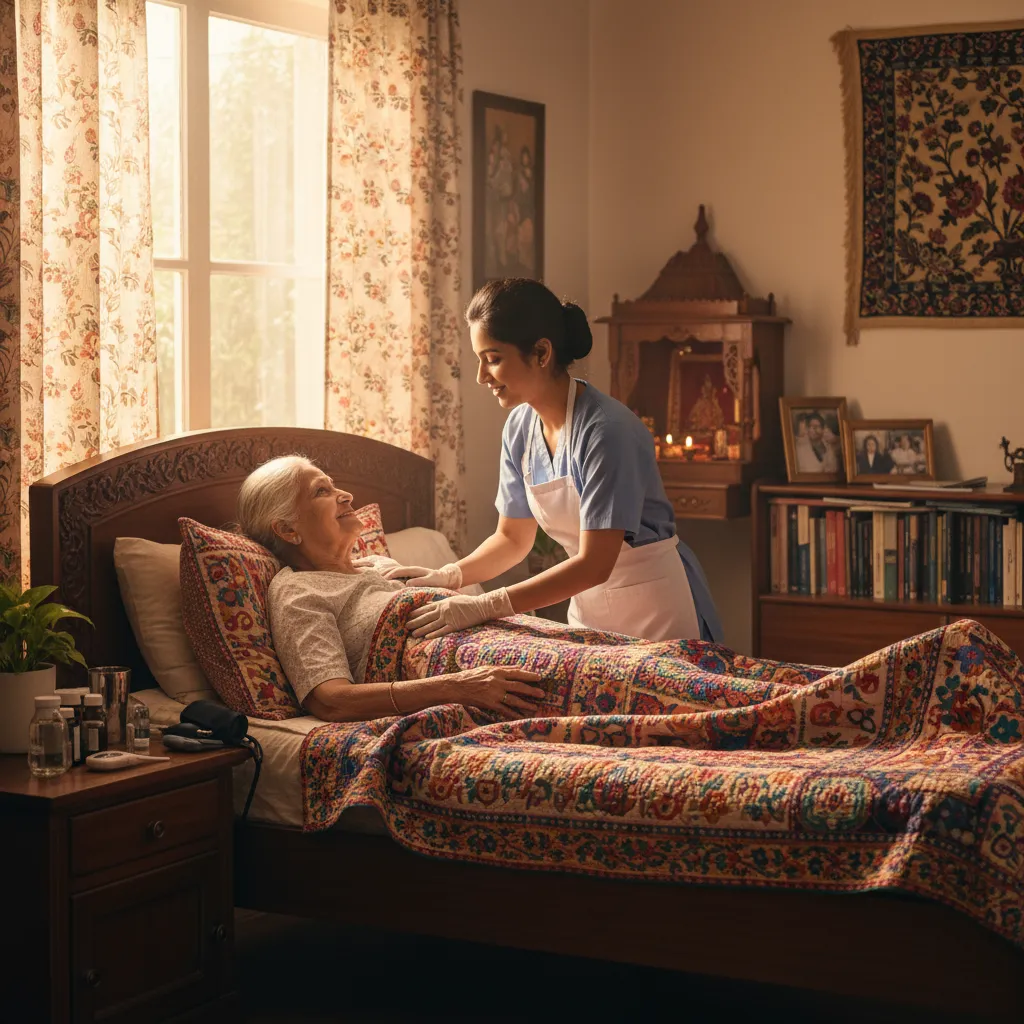
What Is a Daily Bedridden Care Checklist?
A daily bedridden care checklist is a structured routine that ensures hygiene, mobility, vitals monitoring, hydration, emotional care, medication adherence, and safety protocols are followed consistently. It minimizes clinical risks and creates predictable recovery outcomes, especially for post-surgery patients.
What Modern Bedridden Care Means in 2025?
Today’s bedridden patient care is no longer limited to traditional assistance. The ecosystem now includes:
Evidence-based post-surgery recovery methodologies
Remote monitoring
Infection-control protocols
Rehab-driven mobility routines
Tech-enabled vitals tracking
Families increasingly prefer home-based care because it ensures comfort, preserves dignity, and reduces hospital-acquired risks.
To support this shift, our specialized Bedridden Care Services combine trained nurses, advanced equipment, and structured daily routines.
Local Relevance: Why Families in Mysore, Hassan & Shivamogga Prefer Home Care
- Mysore — Faster Recovery Near Calm Residential Pockets
Areas like Vijayanagar, Kuvempunagar, and Gokulam see high demand for home nursing care due to readily available medical support and peaceful neighborhoods ideal for post-surgery recovery. - Hassan — Lower Infection Exposure
In areas near the Ring Road, Vidyanagar, and Santanagar, families increasingly favor home care to avoid prolonged hospital stays. - Shivamogga — Highly Personalized Care Needed
Localities such as Vinoba Nagar, Sagar Road, and Durgigudi prefer home nursing over hospital dependency due to travel constraints and senior population density.
Daily Checklist for Bedridden Patient Care
A robust daily checklist ensures consistency, minimizes risk, and accelerates recovery.
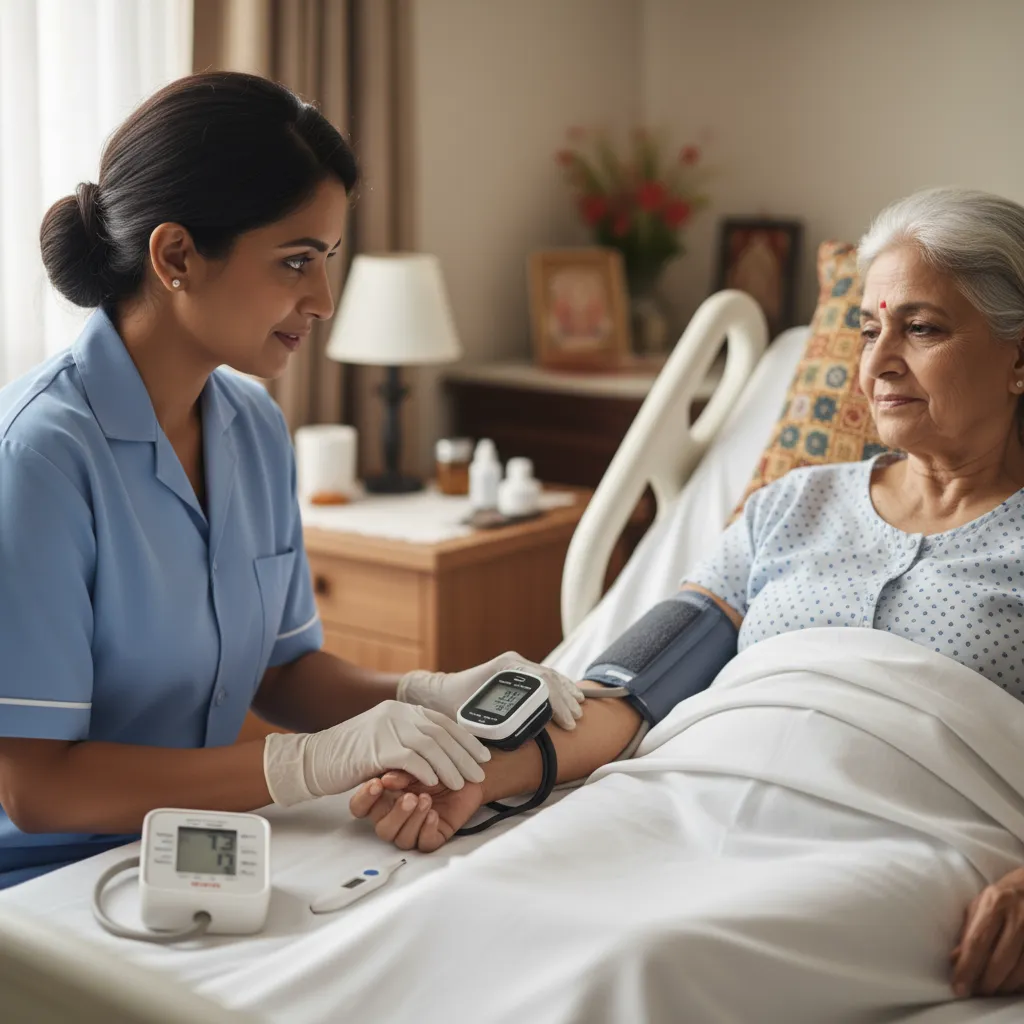
1. Morning Routine (6 AM – 9 AM)
- Wake-Up Assessment
- Check alertness, orientation, hydration, and breathing patterns.
- Inspect pressure zones: heels, elbows, tailbone, hip bones.
- Hygiene & Grooming
Sponge bath
Oral cleaning
Hair & scalp hygiene
Change of clothing
Light moisturization (avoid scented creams)
- Bed Linen Check
- Moisture or wrinkles indicate high infection and bedsore risk.
- Vital Monitoring
Use:
Digital thermometer
BP monitor
Pulse oximeter
Glucometer (if applicable)
2. Nutrition Routine (Throughout the Day)
- Hydration Every 2–3 Hours
- Use hydration reminders or sippers with measurement markers.
- High-Protein Diet
Prioritize:
- Dal, eggs, paneer, boiled chicken
- Soft-cooked vegetables
- Electrolyte supplements if required
- Medication Schedule
- A trained home nurse ensures accurate timing, correct dosage, and surgery-specific medication protocols.
3. Mobility & Positioning (Every 2–3 Hours)
- Repositioning
- Cycle every 3 hours: Left → Back → Right.
- Passive Physiotherapy
Joint rotations
Ankle pumps
Arm lifts
Bed-supported mobility
- Anti-Bedsore Protocol
- Use anti-bedsore air mattresses and supportive pillows.
4. Afternoon Care (12 PM – 3 PM)
- Bowel & Bladder Management
Diaper change
Catheter maintenance
Perineal hygiene
Skin moisture control
- Emotional Wellness
- Light conversations
- Music therapy
- Family engagement
- Simple cognitive prompts
5. Evening Routine (4 PM – 7 PM)
Reassess vitals
Provide a light meal
Final mobility cycle
Clean bed surroundings
6. Night Routine (8 PM – 11 PM)
Administer final medications
Hydrate lightly
Ensure bed linens are dry
Activate night-light and bed rails
Provide call-bell access
Essential Tools for Bedridden Patient Care
Forward-thinking home care is equipment-driven. Recommended tools include:
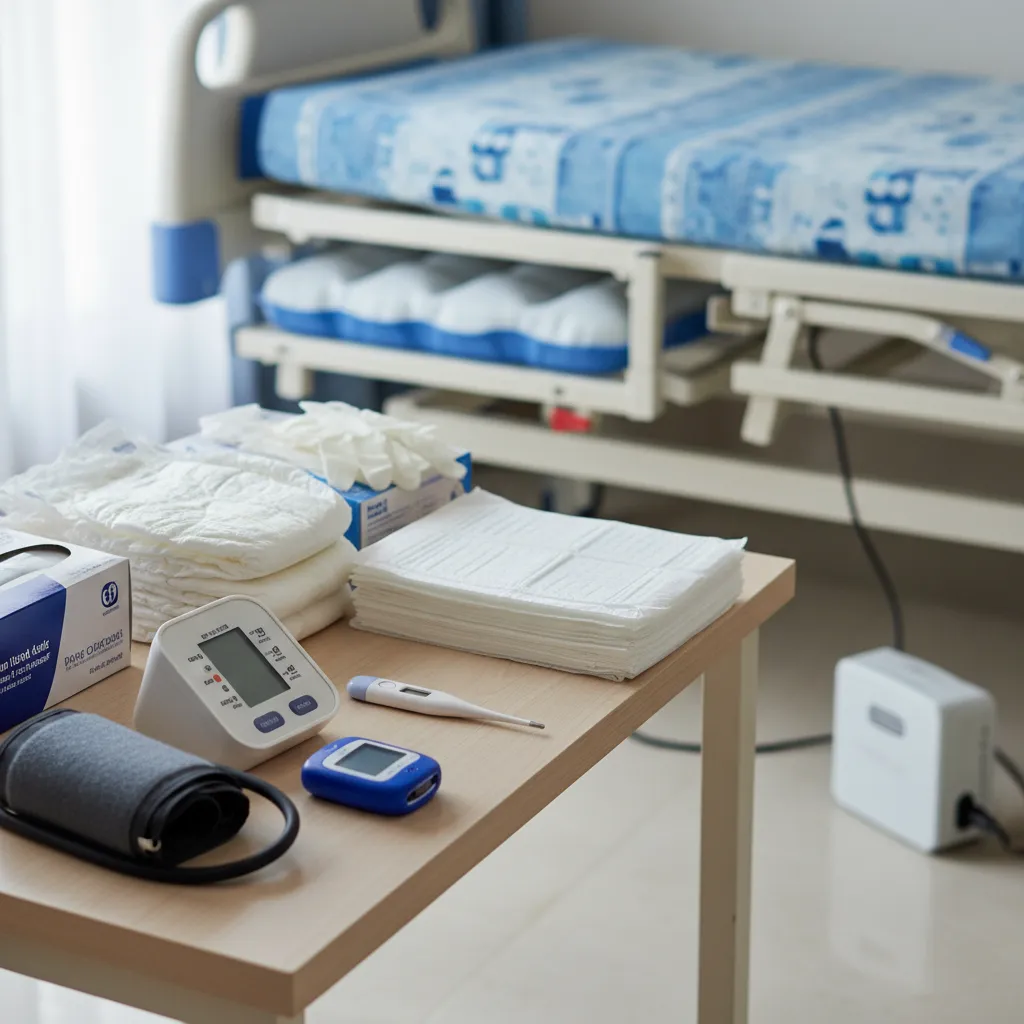
Medical Tools
- Digital thermometer
- BP monitor
- Pulse oximeter
- Nebulizer
- Glucometer
Comfort Tools
- Anti-bedsore air mattress
- Adjustable hospital bed
- Bedside over-table
- Positioning cushions
Hygiene Tools
- Adult diapers
- Water-resistant bed pads
- Disposable gloves
- Wet wipes
- Bed bath kit
Emergency Tools
- Oxygen cylinder
- Suction machine
- Emergency kit
How Our Trained Nurses Ensure Comfort & Dignity?
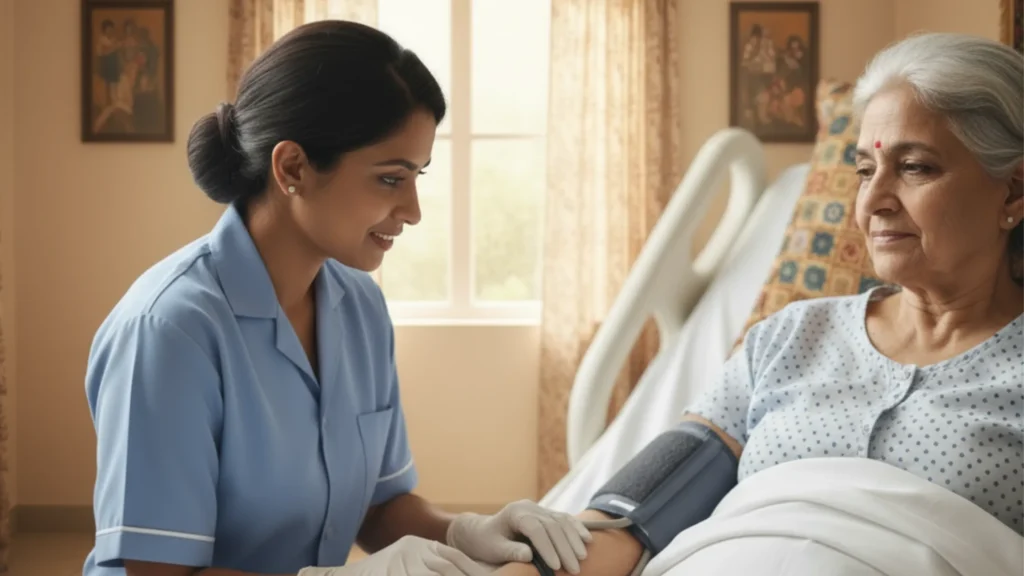
Our caregivers undergo specialized training in:
Post-surgery wound care
Infection-control protocols
Pressure sore prevention
Mobility assistance
Mental health support
Emergency response
Related Post: Elderly Home Care in Shivamogga
Case Study (Hassan)
A 68-year-old hip-replacement patient showed early signs of stiffness and bedsore onset. Our nurse deployed a 3-hour turning cycle, evidence-driven dressing protocol, and passive physio that restored mobility within four weeks.
Our local services in:
Mysore: https://shrimanjunathahomenursing.com/mysore/
Hassan: https://shrimanjunathahomenursing.com/hassan/
Shivamogga: https://shrimanjunathahomenursing.com/shimoga/
How Technology Enhances Home Nursing Today?
Remote vitals monitoring
EMR-based medication tracking
Video consults with doctors
AI-driven alerts for pressure sore risk
Home care is quickly becoming smarter, safer, and more predictable.
Booking Process: Simple, Fast & Reliable
Call our care manager
Assessment of patient condition
Customized care plan
Nurse deployment at home
Daily monitoring & reporting
FAQ's for Daily Checklist for Bedridden Patient Care
Follow a structured routine involving hygiene, mobility, medication timing, nutrition, and emotional support.
Anti-bedsore air mattresses offer optimal pressure distribution.
At least once daily, or more frequently depending on moisture and hygiene needs.
Reposition every 2–3 hours and use pressure-relief tools.
If the patient requires wound care, mobility assistance, catheter management, or monitoring.
Yes, for many post-surgery patients, home care reduces infection exposure.
With consistent care, yes. Many regain mobility faster in a home environment.
Book a Local Assessment—Mysore, Hassan, and Shimoga
For professional, structured and compassionate bedridden care in:
Mysore • Hassan • Shivamogga
📞 +91 7760389998
📞 +91 9035853555
📞 +91 08202978979
📧 manjunathahomecare@gmail.com

